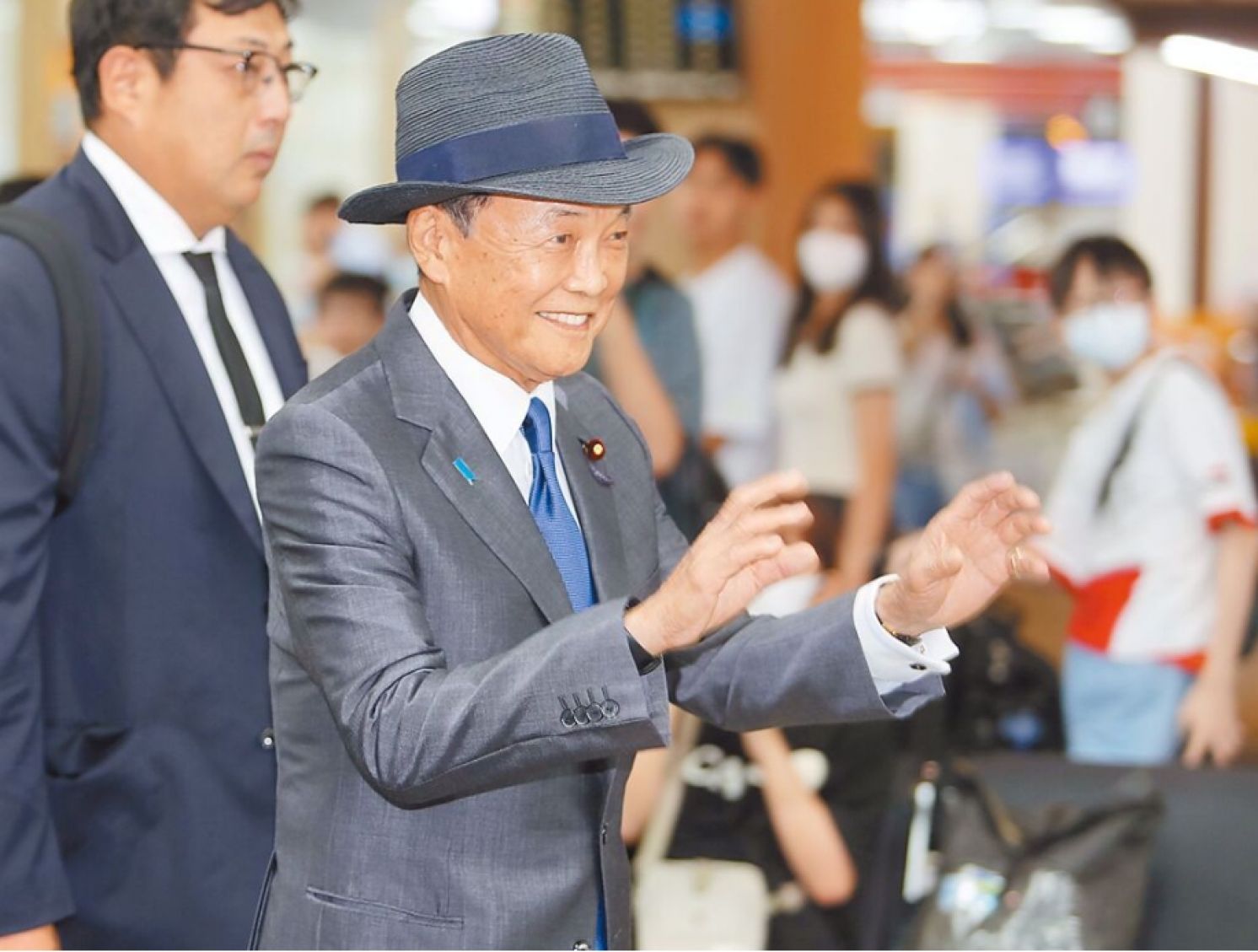
Aso's "War Readiness" Comments Should Not be Misread
Want Daily Editorial, August 10, 2023
Taro Aso, vice president of the Liberal Democratic Party (LDP) and former prime minister of Japan, arrived in Taiwan for a three-day visit on August 7. This marks Mr. Aso's first trip to Taiwan in 12 years and represents the highest-level visit to Taiwan by the LDP since diplomatic relations were severed in 1972. He delivered a speech at the "Ketagalan Forum" with trenchant comments.
Mr. Aso opined that preventing a conflict in the Taiwan Strait requires deterrence. He breaks deterrence down into three parts: First, having the "capability to deter" through military preparedness. Second, having the "capability to execute," which means having the public's endorsement for using military force. Third, the most crucial point is ensuring that the opponent fully understands the capacity for deterrence. All three prerequisites must be satisfied for deterrence to be effective. According to Mr. Aso, a nation must be generally aware that if it needs to utilize its deterrence capability, it should be mentally prepared for combat and make its determination clear to the opponent. To maintain security and stability in the Taiwan Strait, it is justified to demonstrate the possibility of employing military force against a possible Chinese invasion.
Mr. Aso's pro-Taiwan stance is evident, emphasizing a "Japan-Taiwan relationship of mutual assistance in difficult times." However, the ruling Democratic Progressive Party (DPP) has interpreted Mr. Aso's "pro-Taiwan" stance as reliance on or support for Vice President and DPP presidential candidate William Lai, attempting to temper the notion of skepticism towards him. In reality, Japan's attitude towards Taiwan's presidential election resembles that of the United States. Both countries do not favor a specific candidate.
Mr. Aso emphasized the importance of establishing a "deterrence capability" for the sake of "peace," but he has no intention of provoking a military conflict with China. Mr. Aso straightforwardly stated that "deterrence is necessary to prevent a war in the Taiwan Strait," but he believes that "deterrence" must be complemented by "dialogue." Otherwise, it could exacerbate security dilemmas, escalate tensions, and ultimately lead to a war that no party desires. The primary contribution of the next president of Taiwan to peace in the Indo-Pacific region will be the revival of cross-strait dialogue. However, Mr. Lai does not recognize the "1992 Consensus" and devotes himself to the goal of entering the White House in the United States. This approach contradicts Japan's desire for peace, and reinforces Mr. Lai's role as a "troublemaker."
While Japan "supports Taiwan," it has no intention of sacrificing its crucial relationship with China. Japan hopes that the resumption of dialogue between the United States and China could open a window of opportunity to readjust Sino-Japanese relations. Prime Minister Fumio Kishida of Japan has expressed his desire to visit China multiple times, exploring the potential for a "summit diplomacy" with China. Although he has adopted an anti-China stance on strategic security issues with China, Mr. Kishida values the economic relationship between the two countries and strives to roll with the punches in China-Japan relations.
Japan has sided with the United States in the competition with China, causing Sino-Japanese relations to continue to decline. However, the pattern of "political coldness and economic warmth" persists. In 2022, China remained Japan's largest export market, with bilateral trade reaching $357.4 billion. Economic interdependence between China and Japan remains unchanged. A survey by Japan’s Ministry of Foreign Affairs revealed that there are over 30,000 Japanese businesses in China, accounting for about 40 percent of the total number of Japanese businesses overseas. The average profit margin for Japanese businesses in China is 15 percent, double that of other overseas and domestic Japanese companies, making it a lucrative "cash cow." The Japanese publication "JB Press" predicts that as global supply chains gradually shrink and some countries form their own economic spheres in succession due to U.S.-China rivalry, Japan's economic inclination to lean "less on the U.S. and more on China" will become obvious.
While there has been no progress in Prime Minister Kishida's visit to mainland China, the leader of the ruling coalition's Komeito Party, Natsuo Yamaguchi, visited the mainland at the end of August to support Mr. Kishida's diplomatic gestures towards China. Wu Jianghao, mainland China’s ambassador to Japan, expressed during a seminar commemorating the 45th anniversary of the conclusion of the China-Japan Peace and Friendship Treaty, hosted by the Japan-China Friendship Association, that no matter how difficult the China-Japan relationship becomes or the obstacles it faces, both sides should adhere to the inchoate intention of "eliminating disturbances" and ensure that the relationship remains on the "right track."
Structural improvement in China-Japan relations in the short term might not be easy, but both sides have shown sincerity in promoting dialogue. The DPP should not misinterpret Mr. Aso's "war readiness theory." As the United States and Japan strive to restart dialogue with China, Taiwan should take advantage of the situation and seize the momentum.
From: https://www.chinatimes.com/newspapers/20230810000630-260301?chdtv